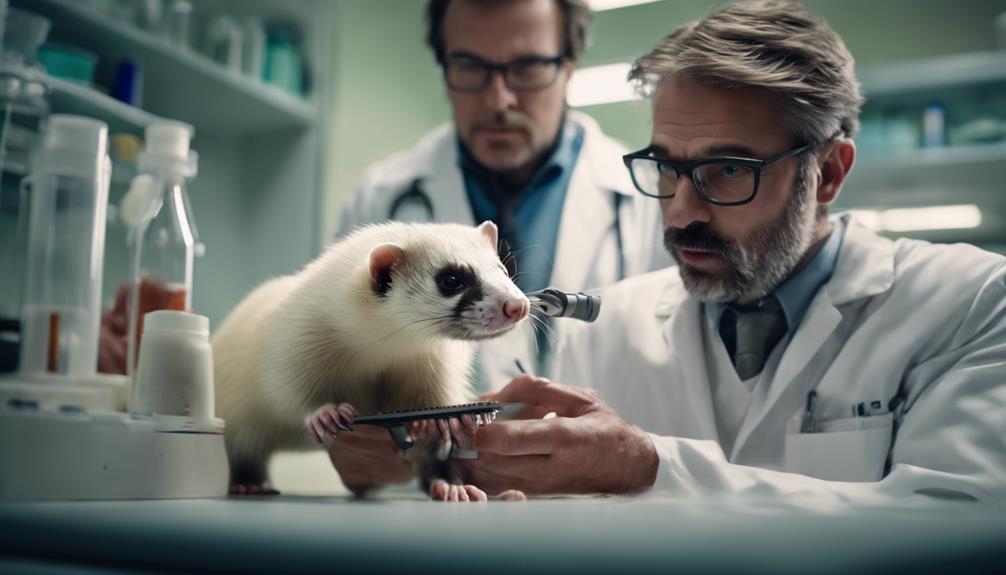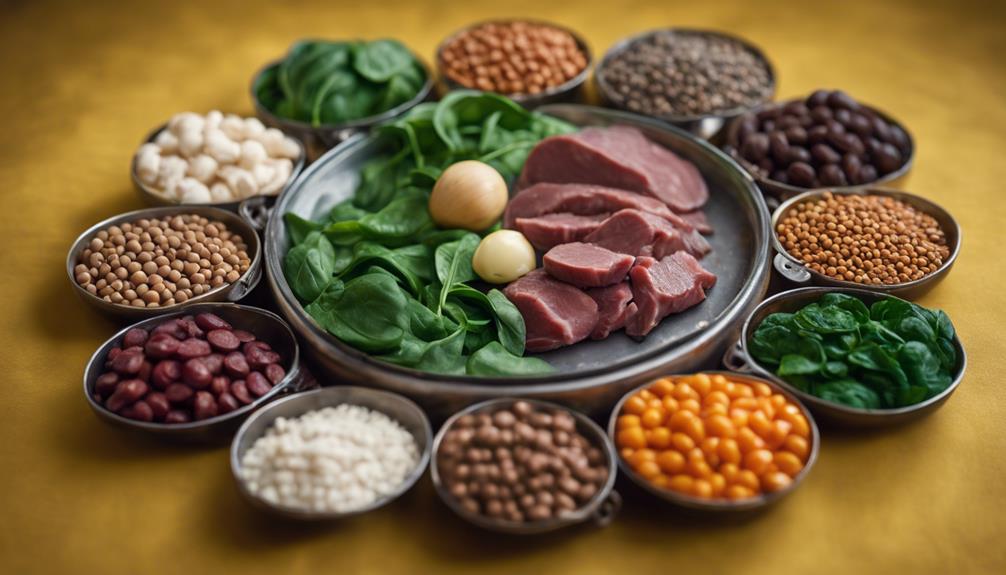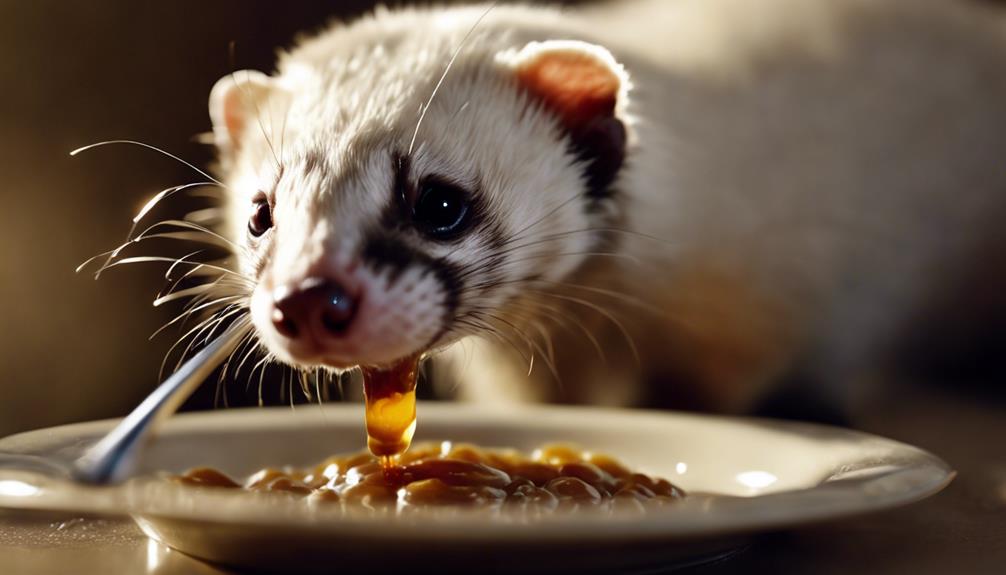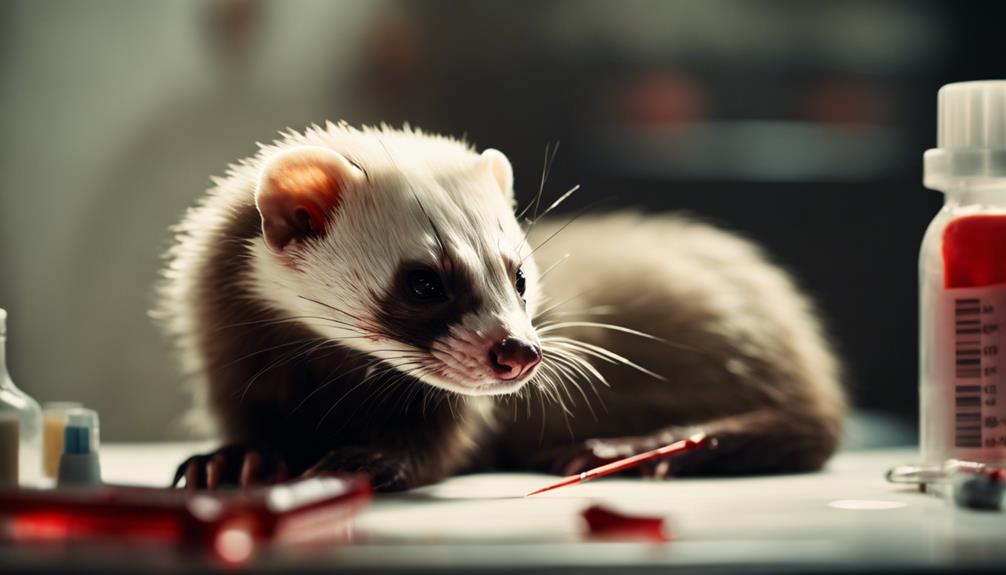How to Address Iron Deficiency in Ferrets

Iron deficiency in ferrets can be a serious health concern that affects their overall well-being. Common symptoms of iron deficiency in ferrets include lethargy, weakness, pale gums, and poor coat condition. To address this issue, it is important to provide a balanced diet that includes high-quality protein sources and vitamin-rich foods. Supplements may be necessary in severe cases, but it is crucial to consult with a veterinarian before adding any supplements to your ferret's diet. Regular veterinary check-ups and blood tests can help monitor your ferret's iron levels and overall health. By taking proactive steps to ensure your ferret's nutritional needs are met, you can help them lead a healthier and happier life.
Implementing these strategies can help prevent and address iron deficiency in ferrets, promoting their overall health and well-being. Regular monitoring and adjustments to their diet and supplements, in consultation with a veterinarian, can ensure that your ferret receives the necessary nutrients to thrive. Remember that each ferret is unique, and their dietary needs may vary, so it is essential to tailor their nutrition plan to their individual requirements. By prioritizing your ferret's health and well-being, you can enjoy many happy and healthy years together.
Understanding Iron Deficiency in Ferrets
Iron deficiency in ferrets is a common nutritional disorder that can have serious health implications if not properly addressed. Understanding iron absorption and meeting their nutritional needs is crucial for the well-being of these small animals. Ferrets, being obligate carnivores, have a unique dietary requirement for high-quality protein and fats. However, they also need certain amounts of iron for various physiological functions, including oxygen transport in the blood.
Iron absorption in ferrets is a complex process that involves the uptake of dietary iron in the small intestine. Unlike humans and some other animals, ferrets have a limited ability to regulate iron absorption based on their body's needs. Therefore, it's essential to provide them with a balanced diet that meets their iron requirements without causing an overload.
Meeting the nutritional needs of ferrets, including iron intake, requires careful consideration of their diet composition. Providing them with a well-formulated, species-appropriate diet is key to preventing iron deficiency and ensuring their overall health and vitality.
Symptoms of Iron Deficiency

Experiencing a deficiency in iron can manifest in ferrets through a variety of subtle yet crucial signs that require close observation for timely intervention. When iron absorption or metabolism is compromised in these small animals, several symptoms may indicate a deficiency:
- Lethargy: Ferrets may appear less active than usual, showing a lack of interest in play or exercise.
- Pale Gums: By gently lifting your ferret's lip, you can check the color of their gums. Pale or whitish gums may suggest decreased red blood cell production due to iron deficiency.
- Weight Loss: Unexplained weight loss in ferrets can be a symptom of various health issues, including iron deficiency. Monitoring their weight regularly can help detect such changes early.
Observing these symptoms in ferrets can provide valuable insights into their health status and prompt the necessary actions to address iron deficiency before it escalates into more severe complications.
Diagnosing Iron Deficiency

Veterinarians diagnose iron deficiency in ferrets through a combination of clinical signs, blood tests, and medical history. Symptoms such as weakness, lethargy, and pale mucous membranes are often indicators of anemia, prompting further investigation.
Blood tests revealing low levels of hemoglobin and serum iron help confirm the diagnosis, allowing for appropriate treatment options to be considered.
Symptoms of Deficiency
Detecting iron deficiency in ferrets can be challenging due to the subtlety of symptoms they exhibit. Ferret owners should be vigilant for signs such as:
- Lethargy and weakness
- Pale gums and inner eyelids
- Decreased appetite
These symptoms may indicate a potential iron deficiency in ferrets. If these signs are observed, it's crucial to consult a veterinarian promptly for proper diagnosis and treatment.
Treatment options may involve dietary changes, including introducing iron-rich foods. In some cases, iron supplements may be necessary, with regular monitoring of iron levels to ensure the ferret's health improves.
Blood Test Results
When diagnosing iron deficiency in ferrets, a blood test is a crucial tool used by veterinarians to assess the levels of iron in the ferret's system. This test helps determine if the ferret is suffering from anemia due to low iron levels. The results of the blood test will indicate the severity of the deficiency, guiding the vet in creating a tailored treatment plan. Monitoring progress is essential, often requiring follow-up appointments to track improvements. Treatment options may include iron injections to boost iron levels effectively. Regular blood tests during the treatment process help ensure the ferret's iron levels are returning to normal. Here's a simple table to illustrate typical blood test results:
| Iron Level | Interpretation |
|---|---|
| Low | Indicates deficiency |
| Normal | Healthy levels |
| High | Possible excess |
Treatment Options
Addressing iron deficiency in ferrets requires a strategic approach to treatment options, aiming to rectify low iron levels and improve the ferret's health. Treatment options may include:
- Iron Injections: Administering iron injections under veterinary supervision can quickly boost the ferret's iron levels.
- Alternative Treatments: Some ferret owners opt for natural remedies or supplements to help increase iron absorption.
- Dietary Restrictions: Adjusting the ferret's diet to include iron-rich foods while limiting substances that inhibit iron absorption, such as calcium or fiber, can be beneficial in treating iron deficiency.
Dietary Changes for Iron Boost

Ferrets with iron deficiency can benefit greatly from dietary changes aimed at boosting their iron levels.
Incorporating food sources rich in iron and planning balanced meals are crucial strategies to address this deficiency.
Food Sources Rich in Iron
Incorporate a variety of iron-rich foods into a ferret's diet to help boost their iron levels effectively. When addressing iron deficiency in ferrets, consider including the following in their diet:
- Iron-rich treats: Treats like cooked beef or chicken liver can be excellent sources of iron for ferrets.
- Homemade diets: Creating homemade ferret meals using ingredients such as organ meats like liver or heart can provide a natural source of iron.
- Commercial ferret food: Opt for high-quality commercial ferret foods that are specifically formulated to meet their nutritional needs, including iron requirements.
Balanced Meal Planning
When planning balanced meals to boost iron levels in ferrets, focus on incorporating a variety of nutrient-rich ingredients to ensure optimal health and well-being.
Meal planning tips for ferrets should include a mix of iron-rich foods such as organ meats, lean meats, and certain fruits and vegetables like spinach and peas. Ensuring nutritional balance is crucial to support iron absorption in ferrets.
Consider adding vitamin C-rich foods to enhance iron absorption. Additionally, whole prey items like mice or chicks can provide a natural source of iron in a ferret's diet.
It's essential to consult with a veterinarian or exotic animal nutritionist to tailor a meal plan that meets your ferret's specific iron needs while maintaining overall dietary balance.
Iron Supplements for Ferrets

Iron supplements are a crucial component in addressing iron deficiency in ferrets, ensuring their overall health and well-being. When choosing iron supplements for ferrets, it's essential to consider factors such as iron absorption and supplement dosage to provide adequate support for these small creatures.
- Iron Absorption: Ferrets have a unique gastrointestinal system that impacts how they absorb nutrients, including iron. Choosing supplements with high bioavailability ensures that ferrets can efficiently absorb the iron they need to combat deficiency.
- Supplement Dosage: Determining the correct dosage of iron supplements for ferrets is crucial. Consult with a veterinarian to establish the appropriate amount based on the ferret's age, weight, and specific iron deficiency levels. Administering the correct dosage will help prevent under or over-supplementation, promoting optimal iron levels in the ferret's body.
- Formulation Varieties: There are various forms of iron supplements available for ferrets, including liquid drops, chewable tablets, or powdered formulas. Selecting a formulation that's easy to administer and well-tolerated by ferrets can help ensure they receive their necessary iron intake without difficulty.
Monitoring Iron Levels

To effectively monitor the iron levels in ferrets, regular blood tests are essential for evaluating their overall health status. Ferrets receiving iron supplementation or consuming iron-rich treats should undergo periodic blood work to ensure their iron levels are within the normal range. Monitoring iron levels through blood tests allows veterinarians to detect any potential imbalances or deficiencies early on, enabling timely intervention to prevent the onset of iron deficiency anemia.
During these blood tests, the veterinarian will assess the ferret's iron levels by measuring parameters such as serum iron, total iron-binding capacity (TIBC), and ferritin levels. These tests provide valuable insights into the ferret's iron status and help determine if any adjustments are needed in their diet or supplementation regimen. Regular monitoring is especially crucial for ferrets with a history of iron deficiency or those at higher risk due to health conditions that may affect iron absorption or utilization.
Preventing Iron Deficiency

Ensuring a balanced diet rich in essential nutrients is key to preventing iron deficiency in ferrets. Ferret owners can take several preventative measures to help maintain optimal iron levels in their pets:
- Offer Iron Rich Treats: Introducing iron-rich treats like cooked liver or fortified ferret foods can help supplement your ferret's diet with additional iron.
- Regular Veterinary Check-ups: Schedule regular check-ups with a ferret-savvy veterinarian to monitor your pet's overall health and iron levels. Early detection of any issues can help prevent iron deficiency.
- Balanced Diet: Provide a well-balanced diet that includes high-quality commercial ferret food, meat-based protein, and occasional treats. This variety helps ensure your ferret receives all the necessary nutrients, including iron, to stay healthy.
Frequently Asked Questions
Can Iron Deficiency in Ferrets Be Caused by Factors Other Than Diet?
Iron deficiency in ferrets can be influenced by genetic and environmental factors, not solely diet-related. Changes in behavior, such as decreased appetite or lethargy, may signal a deficiency, impacting iron absorption and overall health.
Are There Any Specific Ferret Food Brands That Are Recommended for Preventing Iron Deficiency?
When it comes to preventing iron deficiency in ferrets, some specific ferret food brands are recommended. These include ferret treats with added iron supplements and high-quality ferret kibble. Homemade diets may lack essential nutrients.
How Often Should a Ferret's Iron Levels Be Monitored Once They Have Been Diagnosed With Iron Deficiency?
Regular monitoring of a ferret's iron levels is crucial once diagnosed with iron deficiency. The vet may recommend frequent check-ups to assess progress. Iron supplementation should also be administered as prescribed to help improve the ferret's condition.
Are There Any Potential Side Effects of Iron Supplements for Ferrets?
Iron supplements can pose risks for ferrets if overdosed. Potential side effects may include gastrointestinal issues and toxicity. It's crucial to monitor dosages closely. Alternative treatments, like dietary adjustments, should be considered for ferret health.
Can Iron Deficiency in Ferrets Lead to More Serious Health Issues if Left Untreated?
Untreated iron deficiency in ferrets can lead to long-term consequences and complications. Behavioral changes like lethargy may occur. It's crucial for ferret owners to monitor their pets' iron levels and seek veterinary care if necessary.











